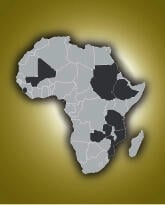Our entire economy, for better or worse, depends upon an active banking sector. Should that sector freeze up, then the entire economy begins to freeze up as well. People are still having a hard time getting money together for a down payment on a home, now that lending requirements are significantly tightened up. My friends in real estate can sell homes, but they can’t get loans approved like they used to: that’s a banking issue.
Now, say Greece defaults later today, just to get it over with. (Greek debt is now CCC and costs more to insure than *Pakistani* debt. Yikes.) OK, first, how do they default? If it’s a soft default, then only European banks take most of the hit, as such a default won’t trigger insurance payouts. On a hard default, US banks are left holding the bag, because US banks are the ones insuring Greek debt. European banks finance it, US banks insure it.
So let’s say the default is bad and hard: the Greek PM resigns and the new guy from the “We’re Not Gonna Take It” party says everyone can take a flying leap into a lake of their choice, they’re all going back to drachmas and autarky. As the financial advisors from North Korea land in Athens, European banks now have to face a drastic reduction in their balance sheets. They will need an infusion of emergency cash to shore up their positions or they’ll be insolvent. Both the cash infusion and the insolvency will be bad things, but the cash infusion allows more room for maneuver, so that’ll happen… until the governments run out of cash. If it’s not there, they’ll have to turn to the ECB, and the ECB itself lacks solid-enough assets to provide a general bailout. That means banks go insolvent and the money-creating ability of banks heads south. That’s deflation, and the economy follows along, with five-cent apples for sale to people that don’t have a dime.
Over here in the USA, debt insurers face a host of claims… not all will be able to pay out 100% of those claims, so they’ll have to get that cash infusion or default. Sure, we got lots of cash in the USA, but we’re already at a discount rate barely above zero. The discount rate has to be that low to avoid hyperinflation: any higher relative to the money supply, and the prices march inexorably upward across the board. With a massive increase in the money supply to bail out a banking system a second time, we cross that discount rate:money supply limit and enter a hyperinflationary environment.
Now maybe we’re lucky enough to withstand the stress of a Greek default. Then we get a Portuguese default, an Irish one, and… oh no, a Spanish one. There’s an analogy to this situation in the game “Buck Buck.” A YouTube video shows what happens to a system that faces repeated stresses… it eventually collapses. While those are kids playing in that video, Bill Cosby tells the story of how his bunch of friends back in the day always won the game of Buck Buck because they had a ringer in one Fat Albert. Fat Albert could crush any competing Buck Buck squad, with ease. Even if Greece is a feather, Portugal feels like a fly landed on us, and Ireland is a leaf, Spain is the Fat Albert of the potential defaulters in our financial game of Buck Buck.
This is why I’m reading Der Spiegel’s reporting on the Euro Crisis religiously.
 Hoo-boy.
Hoo-boy.  Emergent promises a great return on their African funds. The
Emergent promises a great return on their African funds. The 
 I used to work with a great guy, Cali Ruchala, who ran the online ‘zine Sobaka, which isn’t online anymore. Cali isn’t online anymore, but I’m pretty sure he’s happy where he is. Or, at least where he said he was going to be… but that’s not my point. I want to bring him up to cite the origin of the idea of a “cancer baby” and how it applies to authoritarian dictatorships everywhere.
I used to work with a great guy, Cali Ruchala, who ran the online ‘zine Sobaka, which isn’t online anymore. Cali isn’t online anymore, but I’m pretty sure he’s happy where he is. Or, at least where he said he was going to be… but that’s not my point. I want to bring him up to cite the origin of the idea of a “cancer baby” and how it applies to authoritarian dictatorships everywhere. The Seven Dwarfs of the Republican Party had a debate last night and Michele Bachmann managed to get on the media’s radar screens in a big way. This is not good. The woman is insane, misinformed, and ready to sell us all out to the banks.
The Seven Dwarfs of the Republican Party had a debate last night and Michele Bachmann managed to get on the media’s radar screens in a big way. This is not good. The woman is insane, misinformed, and ready to sell us all out to the banks.